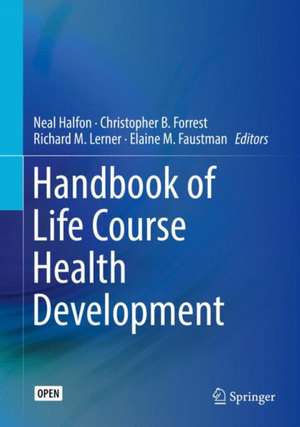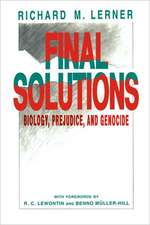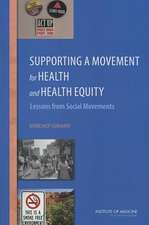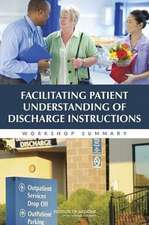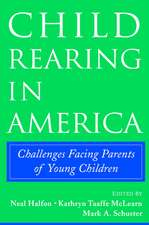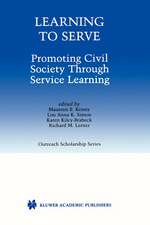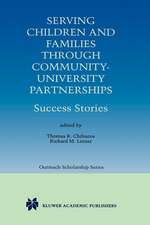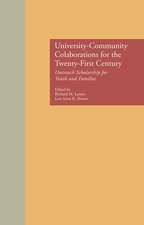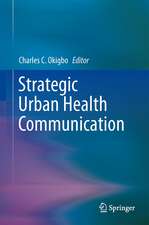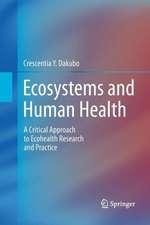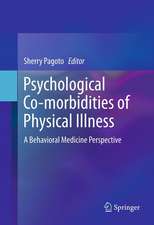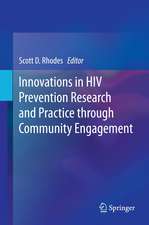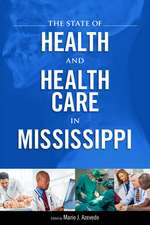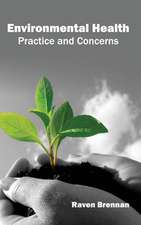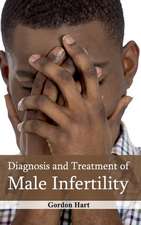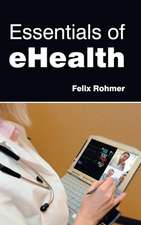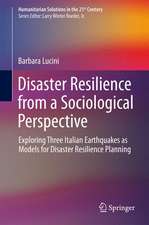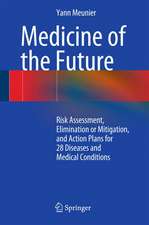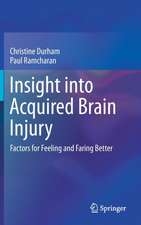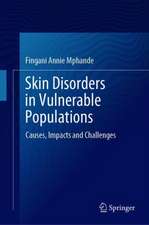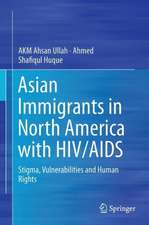Handbook of Life Course Health Development
Editat de Neal Halfon, Christopher B. Forrest, Richard M. Lerner, Elaine M. Faustmanen Limba Engleză Hardback – 7 dec 2017
This book is open access under a CC BY 4.0 license.
This handbook synthesizes and analyzes the growing knowledge base on life course health development (LCHD) from the prenatal period through emerging adulthood, with implications for clinical practice and public health. It presents LCHD as an innovative field with a sound theoretical framework for understanding wellness and disease from a lifespan perspective, replacing previous medical, biopsychosocial, and early genomic models of health. Interdisciplinary chapters discuss major health concerns (diabetes, obesity), important less-studied conditions (hearing, kidney health), and large-scale issues (nutrition, adversity) from a lifespan viewpoint. In addition, chapters address methodological approaches and challenges by analyzing existing measures, studies, and surveys. The book concludes with the editors’ research agenda that proposes priorities for future LCHD research and its application to health care practice and health policy.
This handbook synthesizes and analyzes the growing knowledge base on life course health development (LCHD) from the prenatal period through emerging adulthood, with implications for clinical practice and public health. It presents LCHD as an innovative field with a sound theoretical framework for understanding wellness and disease from a lifespan perspective, replacing previous medical, biopsychosocial, and early genomic models of health. Interdisciplinary chapters discuss major health concerns (diabetes, obesity), important less-studied conditions (hearing, kidney health), and large-scale issues (nutrition, adversity) from a lifespan viewpoint. In addition, chapters address methodological approaches and challenges by analyzing existing measures, studies, and surveys. The book concludes with the editors’ research agenda that proposes priorities for future LCHD research and its application to health care practice and health policy.
Topics featured in the Handbook include:
- The prenatal period and its effect on child obesity and metabolic outcomes.
- Pregnancy complications and their effect on women’s cardiovascular health.
- A multi-level approach for obesity prevention in children.
- Application of the LCHD framework to autism spectrum disorder.
- Socioeconomic disadvantage and its influence on health development across the lifespan.
- The importance of nutrition to optimal health development across the lifespan.
| Toate formatele și edițiile | Preț | Express |
|---|---|---|
| Paperback (1) | 404.48 lei 39-44 zile | |
| Springer International Publishing – 5 sep 2018 | 404.48 lei 39-44 zile | |
| Hardback (1) | 345.01 lei 3-5 săpt. | +63.48 lei 7-13 zile |
| Springer International Publishing – 7 dec 2017 | 345.01 lei 3-5 săpt. | +63.48 lei 7-13 zile |
Preț: 345.01 lei
Preț vechi: 363.16 lei
-5% Nou
Puncte Express: 518
Preț estimativ în valută:
66.02€ • 70.60$ • 55.04£
66.02€ • 70.60$ • 55.04£
Carte disponibilă
Livrare economică 27 martie-10 aprilie
Livrare express 13-19 martie pentru 73.47 lei
Preluare comenzi: 021 569.72.76
Specificații
ISBN-13: 9783319471419
ISBN-10: 3319471414
Pagini: 694
Ilustrații: XXIV, 664 p. 48 illus., 22 illus. in color.
Dimensiuni: 178 x 254 x 45 mm
Greutate: 1.4 kg
Ediția:1st ed. 2018
Editura: Springer International Publishing
Colecția Springer
Locul publicării:Cham, Switzerland
ISBN-10: 3319471414
Pagini: 694
Ilustrații: XXIV, 664 p. 48 illus., 22 illus. in color.
Dimensiuni: 178 x 254 x 45 mm
Greutate: 1.4 kg
Ediția:1st ed. 2018
Editura: Springer International Publishing
Colecția Springer
Locul publicării:Cham, Switzerland
Cuprins
Chapter 1. Introduction to the Handbook of Life Course Health-Development Science.- SECTION I: EMERGING FRAMEWORKS.- Chapter 2. The Emerging Theoretical Framework of Life Course Health-Development.- SECTION II: LIFE STAGES.- Chapter 3. Preconception and Prenatal Factors and Metabolic Risk.- Chapter 4. Early Childhood and the Life Course: The State of the Science and Proposed Research Priorities.- Chapter 5. Middle Childhood: An Evolutionary-Developmental Synthesis.- Chapter 6. Adolescent Health: A Relational Developmental Systems Perspective.- Chapter 7. Emerging Adulthood as a Critical Stage in the Life Course.- Chapter 8. Pregnancy Characteristics and Women’s Cardiovascular Health.- SECTION III: LIFE COURSE ORIGINS AND CONSEQUENCES OF MAJOR HEALTH CONDITIONS AND ISSUES.- Chapter 9. Early in the Life Course: Time for Obesity Prevention.- Chapter 10. Pediatric Type 2 Diabetes: Prevention and Treatment through a Life Course Health-Development Framework.- Chapter 11. Life Course Health-Development in Autism Spectrum Disorders.- Chapter 12. Self-Regulation.- Chapter 13. A Life Course Health-Development Perspective on Oral Health.- Chapter 14. Life Course Health-Development Outcomes after Prematurity: Developing a Community, Clinical, and Translational Research Agenda to Optimize Health, Behavior and Functioning.- Chapter 15. A Life Course Approach to Hearing Health.- Chapter 16. Chronic Kidney Disease: A Life Course Health-Development Perspective.- SECTION IV: CROSS-CUTTING TOPICS IN LIFE COURSE HEALTH-DEVELOPMENT.- Chapter 17. Growth and Life Course Health-Development.- Chapter 18. From Epidemiology to Epigenetics: Evidence for the Importance of Nutrition to Optimal Health-Development across the Life Course.- Chapter 19. How Socioeconomic Disadvantages Get Under the Skin and Into the Brain to Influence Health-Development across the Lifespan.- Chapter 20. Health Disparities: A Life Course Health-Development Perspective and Future Research Directions.- SECTION V: METHODOLOGICAL APPROACHES.- Chapter 21. Core Principles of Life Course Health-Development Methodology and Analytics.- Chapter 22. Epidemiological Study Designs: Traditional and Novel Approaches to Advance Life Course Health-Development Research.- Chapter 23. Using the National Longitudinal Surveys of Youth (NLSY) to Conduct Life Course Analyses.- Chapter 24. Using the Panel Study of Income Dynamics (PSID) to Conduct Life Course Health-Development Analysis.- Chapter 25. Using the Fragile Families and Child Wellbeing Study (FFCWS) in Life Course Health-Development Research.- SECTION VI: FUTURE DIRECTIONS.- Chapter 26. Life Course Research Agenda (LCRA), Version 1.0.
Notă biografică
Neal Halfon, M.D., M.P.H., is the director of the UCLA Center for Healthier Children, Families and Communities. He is also a professor of pediatrics in the David Geffen School of Medicine at UCLA, of health policy and management in the UCLA Fielding School of Public Health, and of public policy in the UCLA Luskin School of Public Affairs. Dr. Halfon’s research has spanned clinical, health services, epidemiologic and health policy domains. For more than a decade, he has worked with national, state and local initiatives aimed at improving early childhood systems. Dr. Halfon has also played a significant role in developing new conceptual frameworks for the study of health and health care, including the Life Course Health Development (LCHD) framework. In 2006Halfon received the Academic Pediatric Associations Annual Research Award for his life time contributions to child health research. He received his M.D. at the University of California, Davis, and M.P.H. at University of California, Berkeley. He completed his pediatric residency at UC San Diego and UC San Francisco. Dr. Halfon was also Robert Wood Johnson Clinical Scholar at UC San Francisco.
Christopher Forrest, M.D., Ph.D., is Professor of Pediatrics and Health Care Management at the Children’s Hospital of Philadelphia (CHOP) and the University of Pennsylvania. He is the Director of the CHOP Center for Applied Clinical Research, which uses life course health development science to adva^5 million children) that conducts patient-centered outcomes research among children and youth. He is the Chair of the Research Committee for PCORnet, the national clinical research network funded by PCORI. He also chairs the Steering Committee for the NIH program called PEPR, which is conducting longitudinal studies on person-reported outcome measures in children with chronic conditions. Dr. Forrest received his BA and MD degrees from Boston University and completed his PhD in Health Policy and Management at Johns Hopkins School of Public Health.
Richard M. Lerner, Ph.D., is the Bergstrom Chair in Applied Developmental Science and the Director of the Institute for Applied Research in Youth Development at Tufts University. He went from kindergarten through Ph.D. within the New York City public schools, completing his doctorate at the City University of New York in 1971 in developmental psychology. Dr. Lerner has more than 700 scholarly publications, including 80 authored or edited books. He was the founding editor of the Journal of Research on Adolescence and Applied Developmental Science, which he continues to edit. He was a 1980-81 fellow at the Center for Advanced Study in the Behavioral Sciences and is a fellow of the American Association for the Advancement of Science, the American Psychological Association, and the Association for Psychological Science. Dr. Lerner is known for his theory of relations between life-span human development and social change and for his research about the relations between adolescents and their peers, families, schools, and communities. His work integrates the study of public policies and community-based programs with the promotion of positive youth development and youth contributions to civil society. He is married to Dr. Jacqueline V. Lerner, Professor in the Department of Applied Developmental and Educational Psychology in the Lynch School of Education at Boston College. They live in Wayland, Massachusetts. They have three children, Justin, a director and screen writer living in Los Angeles, Blair, an advertising executive at Media Contacts in Boston, and Jarrett, a novelist and editor living in Boston.Elaine M. Faustman, Ph.D., DABT, is Professor in the Department of Environmental and Occupational Health and Director of the Institute for Risk Analysis and Risk Communication at the School of Public Health and Community Medicine at the University of Washington. She directs the NIEHS and EPA funded Center for Child Environmental Health Risks Research and led the Pacific Northwest Center for the National Children’s Study. She is an elected fellow of both the American Association for the Advancement of Science and the Society for Risk Analysis. Dr. Faustman is an affiliate professor in the School of Public Affairs at the University of Washington and has been an affiliate Professor in the Department of Engineering and Public Policy at Carnegie-Mellon University. She has served on the National Toxicology Program Board of Scientific Counselors, the National Academy of Sciences Committee on Toxicology, the Institute of Medicine Upper Reference Levels Subcommittee of the Food and Nutrition Board, and on numerous editorial boards. Dr. Faustman chaired the National Academy of Sciences Committee on Developmental Toxicology. She has or is currently serving on the executive boards of the Society of Toxicology, the Society for Risk Analysis and NIEHS Council. She is past President of the Teratology Society. Her research interests include understanding mechanisms that put children and the public at risk from environmental agents. Currently she is serving on the Committee on NAS Gulf War and Health, Volume 11: Generational Health Effects of Serving in the Gulf War. In particular, Dr. Faustman is interested in the molecular and cellular mechanisms of developmental and reproductive toxicants, characterizing in vitro techniques for developmental toxicology assessment, and development of biologically based dose-response models for non-cancer risk assessment. Dr. Faustman’s research expertise includes development of decision-analytic tools for communicating and translating new scientific findings into risk assessment and risk management decisions.
Christopher Forrest, M.D., Ph.D., is Professor of Pediatrics and Health Care Management at the Children’s Hospital of Philadelphia (CHOP) and the University of Pennsylvania. He is the Director of the CHOP Center for Applied Clinical Research, which uses life course health development science to adva^5 million children) that conducts patient-centered outcomes research among children and youth. He is the Chair of the Research Committee for PCORnet, the national clinical research network funded by PCORI. He also chairs the Steering Committee for the NIH program called PEPR, which is conducting longitudinal studies on person-reported outcome measures in children with chronic conditions. Dr. Forrest received his BA and MD degrees from Boston University and completed his PhD in Health Policy and Management at Johns Hopkins School of Public Health.
Richard M. Lerner, Ph.D., is the Bergstrom Chair in Applied Developmental Science and the Director of the Institute for Applied Research in Youth Development at Tufts University. He went from kindergarten through Ph.D. within the New York City public schools, completing his doctorate at the City University of New York in 1971 in developmental psychology. Dr. Lerner has more than 700 scholarly publications, including 80 authored or edited books. He was the founding editor of the Journal of Research on Adolescence and Applied Developmental Science, which he continues to edit. He was a 1980-81 fellow at the Center for Advanced Study in the Behavioral Sciences and is a fellow of the American Association for the Advancement of Science, the American Psychological Association, and the Association for Psychological Science. Dr. Lerner is known for his theory of relations between life-span human development and social change and for his research about the relations between adolescents and their peers, families, schools, and communities. His work integrates the study of public policies and community-based programs with the promotion of positive youth development and youth contributions to civil society. He is married to Dr. Jacqueline V. Lerner, Professor in the Department of Applied Developmental and Educational Psychology in the Lynch School of Education at Boston College. They live in Wayland, Massachusetts. They have three children, Justin, a director and screen writer living in Los Angeles, Blair, an advertising executive at Media Contacts in Boston, and Jarrett, a novelist and editor living in Boston.Elaine M. Faustman, Ph.D., DABT, is Professor in the Department of Environmental and Occupational Health and Director of the Institute for Risk Analysis and Risk Communication at the School of Public Health and Community Medicine at the University of Washington. She directs the NIEHS and EPA funded Center for Child Environmental Health Risks Research and led the Pacific Northwest Center for the National Children’s Study. She is an elected fellow of both the American Association for the Advancement of Science and the Society for Risk Analysis. Dr. Faustman is an affiliate professor in the School of Public Affairs at the University of Washington and has been an affiliate Professor in the Department of Engineering and Public Policy at Carnegie-Mellon University. She has served on the National Toxicology Program Board of Scientific Counselors, the National Academy of Sciences Committee on Toxicology, the Institute of Medicine Upper Reference Levels Subcommittee of the Food and Nutrition Board, and on numerous editorial boards. Dr. Faustman chaired the National Academy of Sciences Committee on Developmental Toxicology. She has or is currently serving on the executive boards of the Society of Toxicology, the Society for Risk Analysis and NIEHS Council. She is past President of the Teratology Society. Her research interests include understanding mechanisms that put children and the public at risk from environmental agents. Currently she is serving on the Committee on NAS Gulf War and Health, Volume 11: Generational Health Effects of Serving in the Gulf War. In particular, Dr. Faustman is interested in the molecular and cellular mechanisms of developmental and reproductive toxicants, characterizing in vitro techniques for developmental toxicology assessment, and development of biologically based dose-response models for non-cancer risk assessment. Dr. Faustman’s research expertise includes development of decision-analytic tools for communicating and translating new scientific findings into risk assessment and risk management decisions.
Textul de pe ultima copertă
This book is open access under a CC BY 4.0 license.
Topics featured in the Handbook include:
- The prenatal period and its effect on child obesity and metabolic outcomes.
- Pregnancy complications and their effect on women’s cardiovascular health.
- A multi-level approach for obesity prevention in children.
- Application of the LCHD framework to autism spectrum disorder.
- Socioeconomic disadvantage and its influence on health development across the lifespan.
- The importance of nutrition to optimal health development across the lifespan.
Caracteristici
Synthesizes research linking early life events with adult health conditions Delineates the developmental origins of common chronic health conditions Specifies processes by which both adversity and opportunity are embedded into developing bio-behavioral systems Examines strategies that minimize the impact of adversity, increase protective factors, and target interventions to coincide with sensitive periods of development? Includes supplementary material: sn.pub/extras
